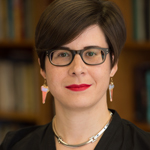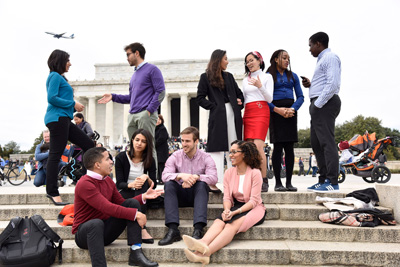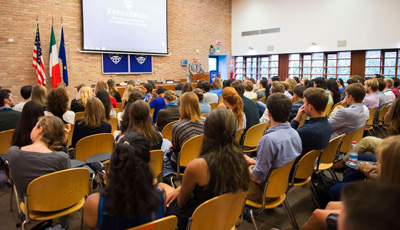Leaders in Graduate Education
THIS GUIDE IS NO LONGER ACTIVE. For the current FP Guide, click here.
Sarah Parkinson, Aronson Assistant Professor of Political Science and International Studies
Johns Hopkins School of Advanced International Studies
“My approach to teaching is centered on the idea that policymaking should be informed by current research,” says Sarah Parkinson, Aronson assistant professor of political science and international studies at Johns Hopkins School of Advanced International Studies (SAIS). “The decisions our students will make in their future careers have the potential to affect policymakers as well as people on the ground in the regions where our graduates will be working.”

“I want students to think through how to adapt methods to a particular context. They need to get a feel for how research methods work in the field.” –Sarah Parkinson, Aronson Assistant Professor of Political Science and International Studies, Johns Hopkins School of Advanced International Studies (SAIS)
Parkinson’s own research examines organizational behavior and social change during and following war. She has conducted extensive fieldwork in Lebanon and Iraq. The catalyst that initially inspired her work dates back to an undergraduate course in Arabic. Parkinson developed a love of the language and a deep interest in the history of the Middle East. That passion eventually brought her to Lebanon as a language student in the summer of 2007. At that time the Lebanese military had launched a campaign against a small militant group that had taken up residence in a Palestinian refugee camp where tens of thousands of civilians were living.
 Seizing an opportunity to accompany a journalist on interviews with Palestinian leaders, Parkinson was able to speak directly with them about the issues their communities were facing and recognize the politics at work. Her understanding of those exchanges in the context of the history of Palestinians in Lebanon eventually led to the work Parkinson does today.
Seizing an opportunity to accompany a journalist on interviews with Palestinian leaders, Parkinson was able to speak directly with them about the issues their communities were facing and recognize the politics at work. Her understanding of those exchanges in the context of the history of Palestinians in Lebanon eventually led to the work Parkinson does today.
Focusing primarily on the Middle East and North Africa, Parkinson uses social network analysis and ethnographic methods to study the ways in which actors such as militant organizations, political factions, and humanitarian groups cope with crisis, disruption, and fragmentation. She is working on a book about the evolution of Palestinian militant organizations and civilian communities in Lebanon throughout the 1980s. It specifically examines factors such as occupation, spying, incarceration, and the role of gender in conflict settings.
In the classroom, Parkinson shares her expertise in qualitative methods and social network theory by examining how a professional such as a consultant or humanitarian worker might use a particular analytical technique or leverage research findings in the field. Her students work through real-world applications of the research they read and analyze as part of their coursework.
 “Researchers often apply technical knowledge to situations where local nuances also matter a great deal,” says Parkinson. “I want students to think through how to adapt methods to a particular context. They need to get a feel for how research methods work in the field.”
“Researchers often apply technical knowledge to situations where local nuances also matter a great deal,” says Parkinson. “I want students to think through how to adapt methods to a particular context. They need to get a feel for how research methods work in the field.”
Johns Hopkins SAIS students have a variety of opportunities for field-based experiences abroad. In addition, by using the classroom as a place where students learn real-world skills, Parkinson’s teaching helps bridge the gap between theory and practice. Her students gain increased understanding of conflicts taking place in environments where it might not be safe for them to travel and where the presence of researchers might seem disrespectful to local populations.
Graduate Degree Program Options:
- Washington, D.C. – Master of Arts (MA); Master of Arts in Global Policy (MAGP); Master of Arts in International Economics and Finance (MIEF); Master of International Public Policy (MIPP); Doctor of Philosophy (PhD)
- SAIS Europe – Master of Arts (MA); Master of Arts in Global Risk (MAGR); Master of Arts in International Affairs (MAIA); Master of International Public Policy (MIPP); Doctor of Philosophy (PhD)
- Hopkins-Nanjing Center – Master of Arts in International Studies; Certificate in Chinese and American Studies; Certificate in Chinese and American Studies + Master of Arts
Visit the Request Info page to receive more information.
Contents
- Leaders in Graduate Education
- Thunderbird School of Global Management, Arizona State University
- Johns Hopkins University, School of Advanced International Studies (SAIS)
- University of Denver, Josef Korbel School of International Studies
- Duke University, Sanford School of Public Policy
- University of Washington, Henry M. Jackson School of International Studies
- UC San Diego School of Global Policy and Strategy (GPS)
- University of Kent, Brussels School of International Studies (BSIS)
- George Mason University, Schar School of Policy and Government
- Indiana University, Hamilton Lugar School of Global and International Studies
- Columbia University, School of International and Public Affairs (SIPA)

